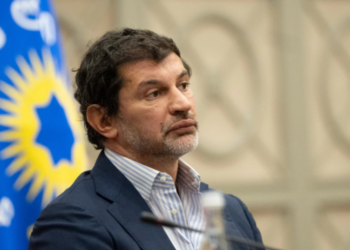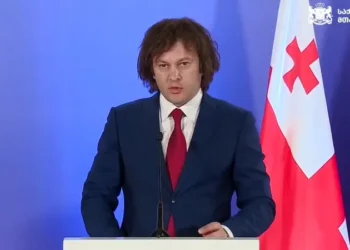On February 1, the European Court of Human Rights (ECHR) ruled that former Mayor of Tbilisi Gigi Ugulava’s right to “independent and impartial tribunal established by law” guaranteed by the Article 6 § 1 of the European Convention of Human Rights was violated by including former Prosecutor General Shalva Tadumadze on Supreme Court bench that ruled on his points-of-law appeal. The second aspect of Ugulava’s complaint regarding the lawfulness of the tribunal was rejected by the ECHR.
In 2020, the three-member chamber of the Supreme Court, consisting of former Prosecutor-General and Supreme Court judge Shalva Tadumadze, Giorgi Shavliashvili and Merab Gabinashvili found Gigi Ugulava, then one of the leaders of opposition European Georgia party guilty of misspending GEL 48 million of public money from Tbilisi Development Fund, while serving as the mayor of the capital city, and sentenced him to three years and two months in jail.
The ECHR concluded that the inclusion of former Prosecutor General of Georgia Shalva Tadumadze on Supreme Court bench that ruled on Ugulava’s points-of-law appeal was sufficient to cast doubt on “objective impartiality” of that court.
The ECHR explained that it had not been shown or argued that judge Tadumadze had held or expressed any personal convictions which could have cast doubt on his subjective impartiality, and noted that Ugulava had not submitted any evidence showing that judge Tadumadze had in fact played a dual role in the criminal proceedings against the applicant. Moreover, according to the ECtHR, the mere fact that Tadumadze was once the Prosecutor-General of Georgia was not a reason for fearing that he lacked partiality.
However, the ECHR noted that Tadumadze led Georgia’s Prosecutor’s Office when Ugulava’s case had been examined by the court of appeal in Georgia and when the decision had been made by the investigative unit at the General Prosecutor’s Office to lodge an appeal on points of law.
As the Prosecutor’s Office of Georgia appeared to the ECtHR to be a hierarchical structure with all prosecutors subordinate to Tadumadze, and to the “politically sensitive context in which the applicant’s high-profile trial had been conducted,” he must have been privy of his office’s strategy against Ugulava.
There are two aspects to the Ugulava’s Article 6 complaint. In addition to the impartiality, Ugulava had also argued to the ECtHR that judge Tadumadze had been appointed to the Supreme Court in violation of a statutory eligibility criterion. The Court rejected the complaint on the unlawfulness of the tribunal due to Ugulava’s failure to raise concerns about Tadumadze’s appointment in the appropriate domestic authority.
According to the ECHR, Ugulava waived his right to make any claim for just satisfaction.
Gigi Ugulava commented on the ECHR’s verdict, saying it “once again demonstrated that our judiciary is the oligarch’s circus.”














